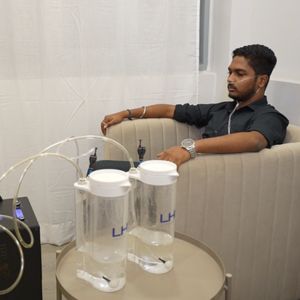
Non-Invasive Techniques for Obesity Management
Obesity is a growing global health challenge, impacting millions of people across all age groups. It’s not just about excess weight; it’s about the significant health risks, from heart disease to diabetes, that come with it. While surgical methods are often considered for weight management, many individuals prefer non-invasive techniques that prioritize safety, long-term results, and holistic well-being.In this guide, we’ll explore a variety of non-invasive approaches that work together to tackle obesity, helping individuals achieve sustainable weight loss while improving their overall health and quality of life.
1. Personalized Dietary Plans: The Cornerstone of Obesity Management
 Diet is the foundation of any weight management plan. Personalized dietary adjustments tailored to an individual’s metabolic rate, nutritional needs, and lifestyle can make all the difference. Key strategies include:
Diet is the foundation of any weight management plan. Personalized dietary adjustments tailored to an individual’s metabolic rate, nutritional needs, and lifestyle can make all the difference. Key strategies include:
- Calorie Deficit Diets: Encouraging gradual, sustainable weight loss by consuming fewer calories than burned.
- Macronutrient Balancing: Optimizing the ratio of proteins, carbs, and fats to enhance energy and satiety.
- Anti-Inflammatory Foods: Incorporating foods like leafy greens, berries, and fatty fish to reduce inflammation and boost metabolism.
- Mindful Eating: Teaching individuals to listen to hunger cues, avoid emotional eating, and practice portion control.
Collaborating with a dietitian ensures these adjustments are both effective and practical for long-term success.
2. Physical Activity: Movement as Medicine
 Exercise complements dietary changes, creating a powerful synergy for weight management. The key is choosing activities suited to individual fitness levels and preferences:
Exercise complements dietary changes, creating a powerful synergy for weight management. The key is choosing activities suited to individual fitness levels and preferences:
- Cardio Workouts: Walking, jogging, or cycling burns calories and strengthens the heart.
- Strength Training: Building muscle boosts metabolism, even at rest.
- Low-Impact Exercises: Yoga, swimming, and Pilates are great options for those with joint pain or limited mobility.
- Functional Movement Therapy: Enhancing mobility and daily physical function for individuals with obesity-related limitations.
A regular exercise routine not only accelerates fat loss but also improves mood, energy levels, and overall health.
3. Behavioral Therapy: Rewiring the Mind for Lasting Change
 Obesity often has emotional and psychological roots, making behavioral therapy an essential component of any non-invasive weight management plan.
Obesity often has emotional and psychological roots, making behavioral therapy an essential component of any non-invasive weight management plan.
Techniques like:
- Cognitive Behavioral Therapy (CBT): Helps individuals recognize and change negative thought patterns about eating and self-image.
- Stress Management Practices: Techniques like mindfulness, meditation, and deep breathing reduce cortisol levels, a hormone linked to weight gain.
- Habit Formation: Setting small, achievable goals and celebrating progress fosters long-term success.
By addressing the mental aspects of weight management, individuals build a solid foundation for sustainable change.
4. Acupuncture: Balancing the Body and Mind
 Acupuncture has gained popularity as a non-invasive technique for weight management by targeting specific points on the body. This ancient practice can:
Acupuncture has gained popularity as a non-invasive technique for weight management by targeting specific points on the body. This ancient practice can:
- Regulate metabolism and digestion.
- Suppress appetite and reduce cravings.
- Lower stress levels to combat emotional eating.
- Balance hormones associated with fat storage.
According to Dr. Amulya,
“Acupuncture works by stimulating the nervous system and promoting the release of hormones that improve digestion, reduce stress, and support weight loss. Auriculotherapy, or ear acupuncture, enhances these effects by targeting points that regulate appetite and stress.”
5. Hydrogen Therapy: Boosting Metabolism and Reducing Inflammation
 Hydrogen therapy is an innovative treatment leveraging the antioxidant power of molecular hydrogen. By reducing oxidative stress and inflammation, it addresses many obesity-related challenges.
Hydrogen therapy is an innovative treatment leveraging the antioxidant power of molecular hydrogen. By reducing oxidative stress and inflammation, it addresses many obesity-related challenges.
This therapy:
- Enhances cellular metabolism, aiding in fat breakdown.
- Increases energy levels, making physical activity more manageable.
- Reduces inflammation, particularly in joints, improving mobility for those with obesity-related pain.
Hydrogen therapy serves as an excellent complementary approach to other non-invasive methods, accelerating results and improving overall well-being.
6. Hormonal Balancing: Addressing Underlying Causes
 Hormonal imbalances often contribute to weight gain, particularly in cases of thyroid dysfunction, PCOS, or menopause. Non-invasive methods to balance hormones include:
Hormonal imbalances often contribute to weight gain, particularly in cases of thyroid dysfunction, PCOS, or menopause. Non-invasive methods to balance hormones include:
- Natural Supplements: Herbs and vitamins like ashwagandha, evening primrose oil, and omega-3s.
- Lifestyle Modifications: Stress management, quality sleep, and regular exercise stabilize hormonal levels.
- Acupuncture and Herbal Medicine: Traditional techniques to restore balance and promote fat metabolism.
Balancing hormones allows the body to burn fat more effectively and maintain a healthy weight.
7. IV Nutritional Therapy: A Boost from Within
 IV nutritional therapy delivers essential vitamins, minerals, and antioxidants directly into the bloodstream for optimal absorption. For obesity management, specific blends can:
IV nutritional therapy delivers essential vitamins, minerals, and antioxidants directly into the bloodstream for optimal absorption. For obesity management, specific blends can:
- Boost energy and metabolism with B-complex vitamins.
- Combats oxidative stress with vitamin C and glutathione.
- Improves muscle function and recovery with magnesium and calcium.
This therapy supports overall health and complements other weight management strategies.
Why Choose Non-Invasive Techniques?
Non-invasive techniques offer a safer, more holistic approach to obesity management compared to surgical interventions. They address root causes—such as lifestyle factors, inflammation, and hormonal imbalances—while promoting long-term habits for better health. By integrating personalized diet plans, physical activity, behavioral therapy, and innovative treatments like acupuncture and hydrogen therapy, individuals can achieve sustainable weight reduction and management without compromising their well-being. Obesity management is more than losing weight; it’s about empowering individuals to take control of their health and improve their quality of life with scientifically backed, non-invasive solutions.



Leave A Comment